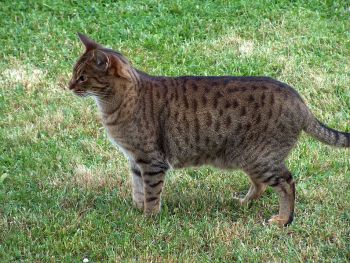
Ocicat
Veterinarian Reviewed on January 4, 2008 by Dr. Janice Huntingford
Physical Characteristics
Breed Group:
Shorthair Group.
Weight:
2.5-6.5 kg.
Height:
Slightly larger than average height and size.
Color(s):
Ocicats come in several different colors, including silver, cinnamon, tawy, lavender, and blue.
Coat:
The Ocicat has a short, spotted coat with a satiny texture.
Overview
Character:
Ocicats are lively, outgoing, and friendly. These vocal cats love to greet people, strangers included, and love to play.
Country of Origin:
USA.
History:
This breed was developed in the United States during the 1960’s when breeder Virginia Daly crossed Abyssinians with Siamese and American Shorthairs. As a relatively new breed, the Ocicat is still quite rare but is present in several countries around the world. Ocicats achieved championship status in 1987.
Name:
This breed was given the name Ocicat by the breeder’s daughter.
Temperament:
As outgoing, people-oriented cats, Ocicats don’t like to be left alone for long periods of time. Ocicats get along well with other cats and dogs and are also good travelers.
Care
Training:
Ocicats are very intelligent and can be trained to walk on a leash, to come when called, to sit on command, and to do several other tasks.
Activity:
Ocicats love to play and are quite active.
Ownership:
These outgoing cats love human attention and make excellent companions. Ocicats are generally very adaptable but they don’t like to be left alone for long periods of time. Social and friendly, this breed does well in households with children, other cats, and other types of pets. The Ocicat’s short coat requires minimal grooming and is quite easy to maintain.
Breeders
No breeders listed at this time.
Sign up for our newsletter and receive more articles and the latest pet health updates and special offers.
Our Expert
 Dr. Janice Huntingford
Dr. Janice HuntingfordJanice Huntingford, DVM, has been in veterinary practice for over 30 years and has founded two veterinary clinics since receiving her Doctor of Veterinary Medicine at the Ontario Veterinary College, University of Guelph. She has studied extensively in both conventional and holistic modalities. Ask Dr. Jan

